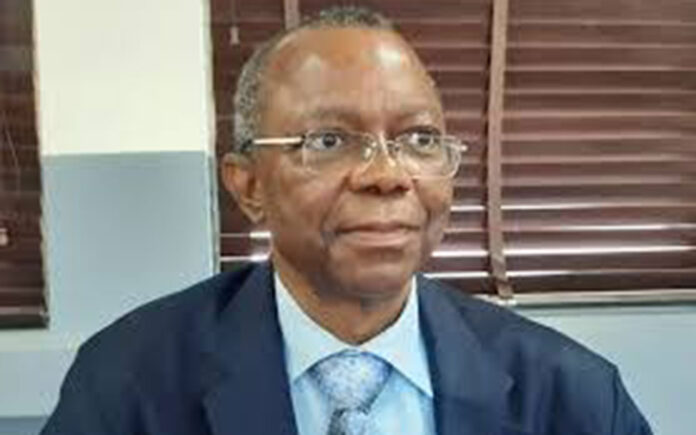•Says tariff threatens Nigeria’s N323.96bn non-oil, non-energy exports to US
CHIGOZIE AMADI
Lagos Chamber of Commerce and Industry (LCCI) has expressed apprehension that Nigeria and many other economies around the world would begin to experience higher inflation rates from escalating tariff wars between the US and the rest of the world.
This position was expressed yesterday by President of LCCI, Mr. Gabriel Idahosa, during the chambers first quarterly press conference for 2025.
Idahosa said Nigeria should evolve strategic and proactive response to President Donald Trump’s tariffs, which were already a threat to Nigeria’s N323.96 billon (in 2024) non-oil, non-energy exports to the US.
He stated, “In the first quarter of 2025, the global economy recorded modest growth, driven by moderate inflation, lower interest rates, improved domestic demand, and investment in developed and emerging markets.
“However, downside risks may stem from geopolitical tensions, trade policy uncertainties, and high debt levels. “With escalating tariff wars between the United States and the rest of the world, we may soon begin to record higher inflation rates across many economies that are directly affected by the tariffs.”
He added that the Nigerian economy might record a limited impact from the exemption of the oil and gas purchases by the US from the 14 per cent tariff on Nigeria.
Idahosa stated, “The tariffs have served to drive oil prices down, indicating a challenge to Nigeria’s foreign exchange earnings from crude.”
According to him, the persisting geopolitical tensions may cause more supply chain disruptions and increase inflation, especially in developing countries.
He advised the central banks to be mindful of using high interest rates to curb inflation.
Idahosa said, “With Trump’s tariffs threatening Nigeria’s N323.96bn (in 2024) non-oil, non-energy exports to the US, we believe a strategic, measured, and proactive response from the Nigerian government is imperative.
“We recommend that the government intensify diplomatic efforts through our relevant ministries to seek clarity on the rationale for the tariffs and explore pathways for reversal or renegotiation with respect to Nigeria’s ban on 25 import items from the US.
“Nigeria can lead the conversations around the Africa Growth and Opportunity Act (AGOA) and other multilateral platforms to sustain the opportunities.”
The LCCI’s president said in view of the global developments due to America’s tariffs, the chamber was recommending that the government should build local competencies in the country’s areas of competitive advantage, particularly agriculture, solid minerals, oil and gas, etc., in order to build the economy and withstand the global shocks that might arise from the trade war.
He stated, “In addition, we must leverage emerging opportunities to diversify the country’s exports and expand our network of trading partners to explore other potential markets.
“With the global oil market facing multiple uncertainties and prices trending downwards (currently below the budget benchmark of $75), the government needs to develop a fiscal response to address potential revenue gaps in the budget and the country’s foreign exchange earnings.”
Idahosa stated that Nigeria must reduce overdependence on a few trade partners by expanding its bilateral trade agreements with emerging economies in Asia, Latin America, and Africa.
He added that the intra-African trade under the African Continental Free Trade Area should be aggressively promoted.
Idahosa said, “We urge the federal government to incentivise local production and value addition in agriculture, mining, and manufacturing.
“Exporting commodities in their primary state must give way to processed finished Nigerian goods that command higher global value.
“The chamber recommends an urgent review of Nigeria’s national trade policy to reflect emerging global realities.
“Our trade, tax, and customs regimes must be modernised to align with WTO rules and safeguard Nigerian interests.”
Commenting of the recent Gross Domestic Product (GDP) report, the president of LCCI said Nigeria’s real GDP grew consistently in all four quarters of 2024, recording 3.84 per cent growth in Q4 2024, which was the highest in three years.
He submitted that even though Nigeria’s GDP growth was positive and above IMF and World Bank projections, “Our growth figures still remain insufficient to absorb our growing labour force or significantly reduce poverty.”
He argued that the real economy or the productive sectors must be well supported to create jobs for our teeming youth population.
According to him, “The real growth of the oil refining subsector showed significant recovery after 23 quarters of contraction since Q1 2019. The government needs to sustain the achievements recorded in the oil refining sector.
“Nigeria can become energy independent, reduce the importation of fuel, ensure stable fuel supplies, and build a robust energy sector.
“The continued weak growth in manufacturing and agriculture suggests that the government should give more attention to the sectors by incentivising investment in the agriculture and agro-processing sectors and addressing factors contributing to the high cost of production, including high inflation, interest rate, volatile exchange rate, and huge infrastructural gaps.”




















